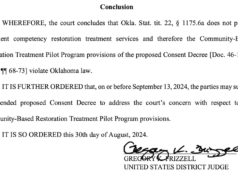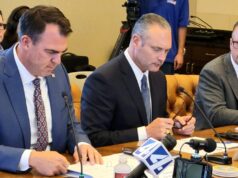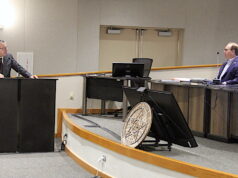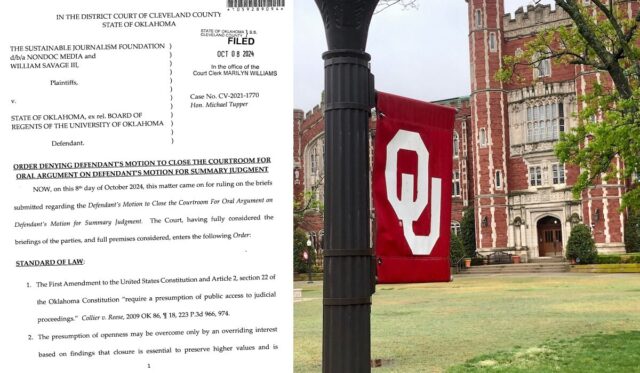

Despite the University of Oklahoma’s attempt to block the public and press from attending, a summary judgment hearing in our Open Records Act litigation seeking reports about misconduct allegations against former President David Boren will be held in open court.
Cleveland County District Court Judge Michael Tupper denied OU’s request to seal the courtroom in a three-page order Oct. 8, and the hearing on OU’s summary judgment motion has been scheduled for 9 a.m. Friday, Nov. 15.
“The university has not overcome the constitutional presumption of public access to summary judgment oral argument in this case. The interests and remedy identified by the university do not meet the high bar for overcoming the presumption that the public may attend the summary judgment hearing,” Tupper wrote. “Closing the hearing will not preserve an overriding interest or higher value.”
Believe it or not, OU had argued that neither the U.S. Constitution nor the Oklahoma Constitution protected the right of the public to attend civil court proceedings on a potentially case-dispositive motion.
On Aug. 28, moments into the scheduled hearing on the university’s motion for summary judgment, OU’s attorneys asked that the courtroom be cleared and sealed. NonDoc’s attorneys objected, citing critical constitutional concerns and the “extraordinary” nature of the request.
“It’s a wildly abnormal procedure, and one that goes, really, to the heart of the matter, your honor,” said Blake Johnson, an attorney with Overman Legal Group representing NonDoc and myself. “This is another of the university’s attempts to stifle public access to matters that are ordinarily opened to the public. (…) This is a public courtroom. Members of the public, members of the press have a constitutional right to be present.”
Mike Burrage, a former federal judge who represents OU, said information about the investigations that Jones Day conducted for the university is “confidential by one of six reasons that the public is not entitled to know.”
“You can harp on the Constitution and all these words, but they mean nothing because these — we’ve always maintained these documents are confidential,” Burrage said.
The remark turned heads in the courtroom and gave the 20 or so people in attendance Aug. 28 a glimpse into the university’s legal position: The Jones Day reports are confidential because OU has designated them so, and the public has no right to investigate or contest the factual basis of that designation.
Read the full
Aug. 28 court transcript.
With OU’s request to close the courtroom sprung upon him at the last minute, Tupper ordered the university to file a formal motion to seal the hearing, but not before members of the media and a reporter of Boren’s actions stood in the gallery to object.
“Your honor, I’m a victim of David Boren’s sexual assault, and I’ve been dealing with this university covering this up. The Open Records Act’s opening language is records are presumed open unless proved otherwise,” said Jess Eddy, whose allegations were deemed “generally credible” by Jones Day in a portion of the sexual misconduct report provided to him by OU. “You’re giving them all the privilege all along. And, your honor, I respect you as a legal professional and a human being, but I’m not leaving this courtroom unless there’s a deputy taking me out of here and taking me to jail. Because I’m sick and tired of this injustice. It happened to too many other people. And they’ve been covering it up for 30, 40 years.”
‘Well-documented and unbroken history of public access’
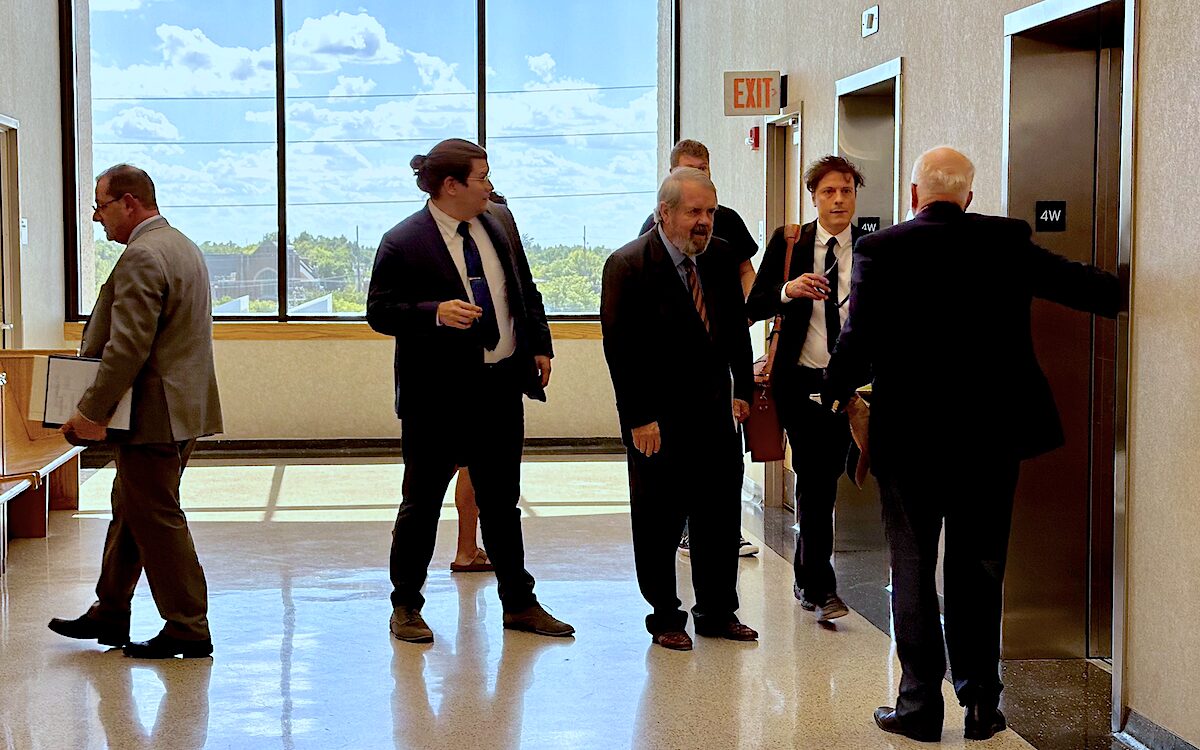
While the court ultimately ordered the rescheduled Nov. 15 hearing to be open — because, of course, the Constitution does mean something — the briefs filed by the university and our nonprofit news organization deserve examination as we celebrate Free Speech Week later this month.
In OU’s motion to close the courtroom, the university argued “an open summary judgment hearing would harm the university and the public” and “would expose non-admitted confidential evidence that concerns privileged documents to the public.”
“The university freely acknowledges there is a general public curiosity about the Jones Day reports at the center of this litigation. However, this summary judgment hearing is not vetted evidence; more specifically, the court does not admit evidence at a hearing for summary judgment like at trial,” OU’s attorneys wrote. “On a related note, the university has previously highlighted that such evidence is not a matter of public interest. More specifically, the Oklahoma Supreme Court has cautioned against releasing non-admitted evidence to the public.”
In NonDoc’s response, we argued that “under state and federal constitutional law, the public has a presumptive right to attend oral argument on summary judgment” and that “there is a well-documented and unbroken history of public access to potentially case-dispositive civil proceedings.”
“The university’s motion generally echoes its counsel’s oral representation that the constitutional presumption of access is just ‘all these words’ that ‘mean nothing’ because [OU] has ‘always maintained these documents are confidential,’” NonDoc’s attorneys wrote. “Although the university claims that it ‘could be subject to civil liability for retaliation under Title IX and the U.S. Constitution if it breaches its prior assurances of confidentiality,’ this speculative possibility is not implicated by information that would be disclosed in court. (…) The university is scared of its own strawman; the specter of a farfetched lawsuit is not a higher value that overrides the federal or state constitutional presumption of access to judicial proceedings.”
In OU’s reply to NonDoc’s brief, the university continued its argument that no public interest exists in the matter at hand. Instead, the university argued that “mere public curiosity and desires for sensational reporting does not override confidentiality concerns.”
However, earlier in the brief, OU acknowledged why students, parents and taxpayers have an obvious interest in the findings of the Jones Day investigations into donor data misreporting and sexual misconduct by the university’s longtime president.
“Plaintiffs seek a private legal document prepared to assist the university [in] protecting its students, employees, and the community,” OU wrote.
Indeed, questions about OU “protecting its students, employees and the community” are extremely relevant to the public. The fact that engaged Oklahomans want transparency and accountability from their public university should hardly be surprising.












